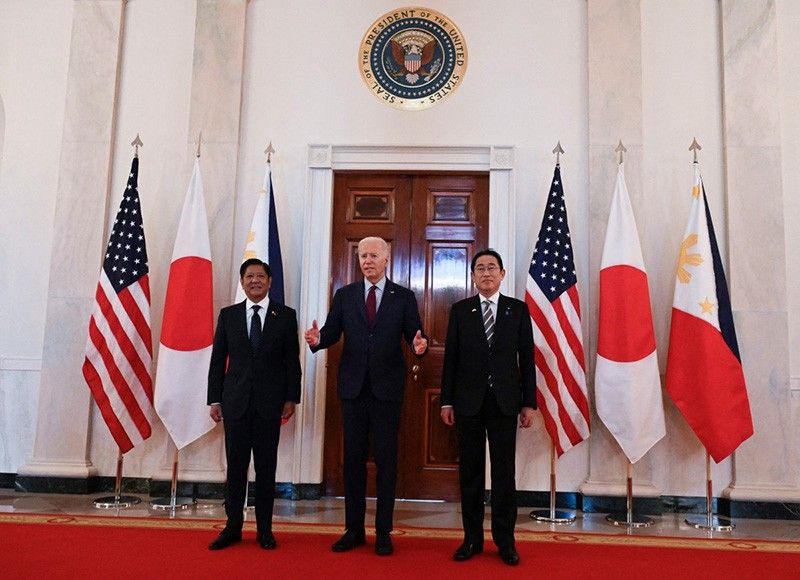Pondering evolving form of trilateral PH-US-Japan partnership: Formal security alliance or loose security network?

On April 11, the leaders of the Philipines, Japan and the United States held their first-ever trilateral summit meeting. This historic event was held in the face of China’s unrelenting expansion in the South China Sea and coercive actions against the Philippines.
A month before this trilateral summit, China Coast Guard (CCG) and maritime militia vessels harassed and strong-armed the Philippine Navy (PN) and Philippine Coast Guard’s (PCG) periodic resupply missions to the small Philippine Marine Corps (PMC) detachment onboard the BRP Sierra Madre on Ayungin Shoal.
On March 5, CCG and Maritime Militia vessels collided with the PCG patrol boats.
On March 23, CCG vessels applied high-pressured water cannons against a Philippine supply boat.
Before the summit, a senior US official said in a press briefing that the trilateral meeting directly responds to China’s coercion against the Philippines in the South China Sea and intends to send a “crystal clear” message of collective unity by Manila, Tokyo, and Washington to Beijing.
US President Joe Biden began the summit by reiterating American security commitments to defend the Philippines and Japan from any armed attacks in the Indo-Pacific. This was a clear warning to China and a concerted effort to reassure its Asian allies that are targets of Chinese coercive activities in the South and East China Seas.
In their joint vision statement, the three leaders expressed severe concerns over Chinese coercive and expansionist behavior in the South and East China Seas. They also affirmed the importance of peace and stability across the Taiwan Straits and called for a peaceful resolution of the cross-straits relations.
The three leaders also expressed satisfaction over their newfound cooperation in support of a free and open Indo-Pacific and their joint commitment to deepen their cooperation further.
With Japan and the US strengthening their respective security relations with the Philippines, the three countries have worked to bring each other closer to deep and comprehensive trilateral security cooperation and build up what can be considered a collective capacity to address common regional security concerns.
Japanese Prime Minister Fumio Kishida described the tripartite arrangement as a multilayered cooperation essential to bolstering a rules-based and open international order.
President Ferdinand Marcos Jr. described the trilateral security arrangement as a partnership, borne not out of convenience nor expediency but as a natural progression of deep relations and robust cooperation amongst three nations linked by profound respect for democracy, good governance, and the rule of law.”
For his part, President Biden considered the trilateral arrangement as a means to reduce redundancies and coordination challenges in a bilateral security arrangement apparent in the hub-and-spokes system of the alliances the US formed separately with the Philippines, Japan, South Korea, and Taiwan at the onset of the Cold War in the early 1950s.
The idea of a trilateral security network
The idea of a trilateral security partnership between the Philippines, Japan and the US is not new. China’s maritime expansion in both the East and South China Sea, its construction of artificial island bases, its militarization of these land features in the South China Sea, and its continued grey zone operations against the Philippines and Japan have pushed these countries to strengthen their respective security ties with each other.
Beginning with the Obama Administration in 2011, Washington has supported increased bilateral relations between US allies, most notably between Australia and Japan, Japan and the Philippines, and trilateral cooperation among Japan, Australia and the US.
These developments have pushed Japan and the US to focus on maritime security issues in the South China Sea, including naval capacity building, maritime domain awareness, joint training and exercises, and port calls in Southeast Asia.
This form of security collaboration of like-minded allies is seen as an extension of the hub-and-spokes system and a counterpoint to an emergent China in the larger context of an evolving regional security configuration. It is premised on the process designed to strengthen the two bilateral alliances and help build connecting threads between them.
On Feb. 24, 2022, Russia launched a full-scale armed invasion of Ukraine. This event brought out an underlying fear among many Southeast Asian states that Russia’s invasion of Ukraine would encourage China to follow suit in the Taiwan Straits, in the South and East China Seas, with the potential of causing collateral damage throughout the region.
In early February 2023, the Philippines and the US announced plans to expand the American strategic footprint in the country, with access to four Philippine military bases, as the two allies sought to deter China’s increasingly aggressive actions toward Taiwan and the disputed South China Sea.
During his first official visit to Japan, President Marcos and Prime Minister Kishida agreed to strengthen their two countries’ security partnership through strategic reciprocal port calls and aircraft visits, transferring more defense equipment and technology, continuous cooperation on previously transferred defense equipment, and capacity building.
During the tail end of his five-day official visit to Japan, President Ferdinand Marcos Jr., at a press conference, revealed that his administration is reviewing a proposed tripartite security pact with the US and Japan.
The issue of form
The recently concluded trilateral summit ensured that the regional security agenda was at the top of the three leaders’ agenda.
However, the summit also focused on fostering and intensifying economic cooperation with Japan, the Philippines and the US, seeking to redirect their key supply chains from China and minimize their overall economic relations with this regional economic powerhouse.
The trilateral summit also raised the prospects of economic measures to finance the construction of critical infrastructure in the Philippines, diverting its raw mineral exports away from China and enhancing cooperation in semiconductor production, clean energy, and efforts to address climate change.
The three leaders’ joint vision statement, however, is conspicuously silent on how this trilateral security partnership would take its institutional shape.
This trilateral relationship could evolve into a formal and standardized security agreement or a loose and de facto trilateral security network. However, the prospect of a formal security agreement among the three countries is not on the table.
This is because Tokyo, Washington, and Manila need to discuss the practical issues of alliance coordination, shared strategic outlook, inter-operability of their respective armed forces, and, more importantly, how their security triangle could be operationalized in the face of a significant armed contingency either in the South China Sea or Taiwan.
Furthermore, a possible trilateral security agreement would face legislative scrutiny and even legal challenges from opposition parties and activist groups in their respective civil societies.
In the meantime, the Philippines, Japan and the US would find it necessary to cooperate through this de facto security network made possible by a strengthened alliance between Tokyo and Washington, with both allies strengthening the foundations of their strategic partnerships with Manila.
This might be the case, as President Marcos implied that “this meeting can be just a beginning.”
Renato Cruz De Castro is trustee and program convenor of think tank Stratbase Institute.
- Latest





























